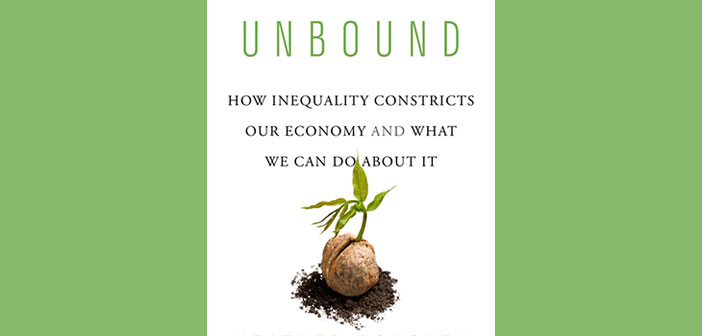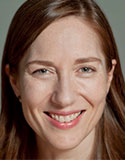
- This event has passed.
Unbound: How Inequality Constricts Our Economy and What We Can Do about It
September 25, 2019 @ 4:00 pm - 6:00 pm
Event Navigation

Do we have to choose between equality and prosperity? Many think that reducing economic inequality would require such heavy-handed interference with market forces that it would stifle economic growth.
Heather Boushey insists that rising inequality actually undermines growth in three ways. It obstructs the supply of talent, ideas, and capital as wealthy families monopolize the best educational, social, and economic opportunities. It also subverts private competition and public investment. Powerful corporations muscle competitors out of business, in the process costing consumers, suppressing wages, and hobbling innovation, while governments underfund key public goods that make the American Dream possible, from schools to transportation infrastructure to information and communication technology networks. Finally, it distorts consumer demand as stagnant wages and meager workplace benefits rob ordinary people of buying power and pushes the economy toward financial instability.
We can preserve the best of our nation’s economic and political traditions, and improve on them, by pursuing policies that reduce inequality—and by doing so, boost broadly shared economic growth.
Arrive early to purchase your copy of Unbound: How Economic Inequality Constricts Our Economy and What We Can Do About It (Harvard University Press), available for sale by University Press Books, before the talk!
Register
 Heather Boushey, is the President & CEO and co-founder of the Washington Center for Equitable Growth. She is one of the nation’s most influential voices on economic policy and a leading economist who focuses on the intersection between economic inequality, growth, and public policy. Her forthcoming book, Unbound: How Economic Inequality Constricts Our Economy and What We Can Do About It (Harvard University Press) will be released in October 2019.
Heather Boushey, is the President & CEO and co-founder of the Washington Center for Equitable Growth. She is one of the nation’s most influential voices on economic policy and a leading economist who focuses on the intersection between economic inequality, growth, and public policy. Her forthcoming book, Unbound: How Economic Inequality Constricts Our Economy and What We Can Do About It (Harvard University Press) will be released in October 2019.
Boushey writes regularly for popular media, including The New York Times, The Atlantic, and Democracy Journal, and she makes frequent television appearances on Bloomberg, MSNBC, CNBC, and PBS. She previously served as chief economist for Secretary of State Hillary Clinton’s 2016 presidential transition team and as an economist for the Center for American Progress, the Joint Economic Committee of the U.S. Congress, the Center for Economic and Policy Research, and the Economic Policy Institute. She sits on the board of the Opportunity Institute and is an associate editor of Feminist Economics. She received her doctorate in economics from the New School for Social Research and her bachelor’s degree from Hampshire College.
